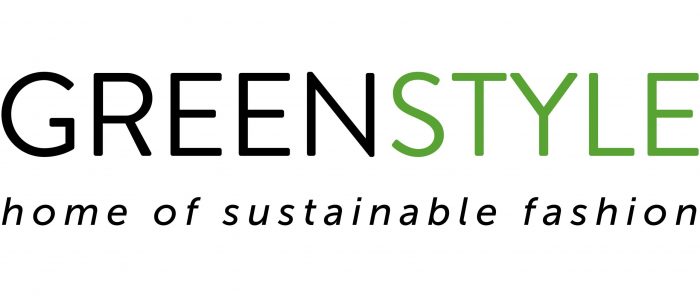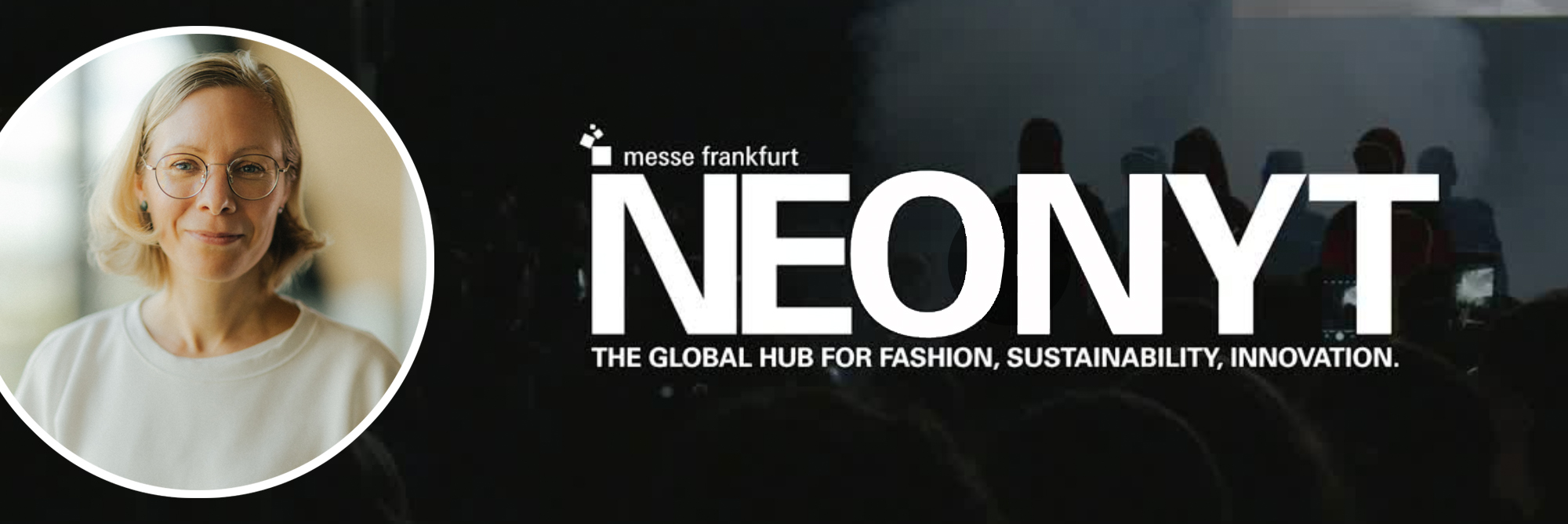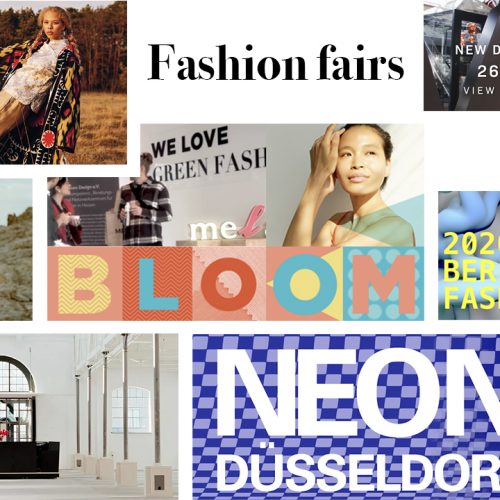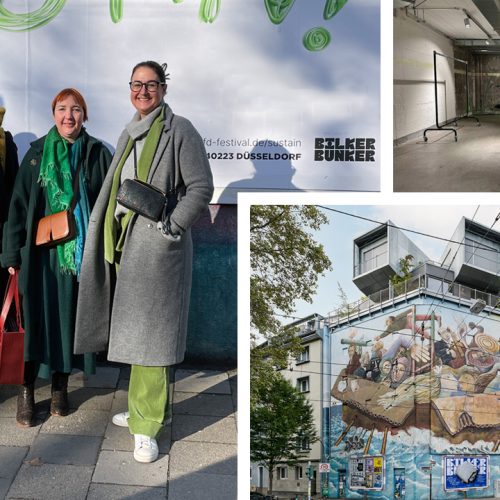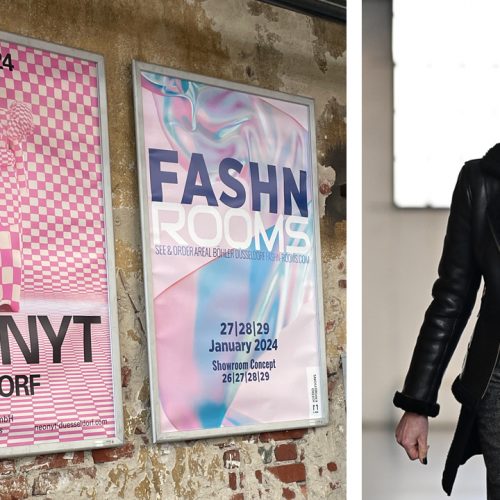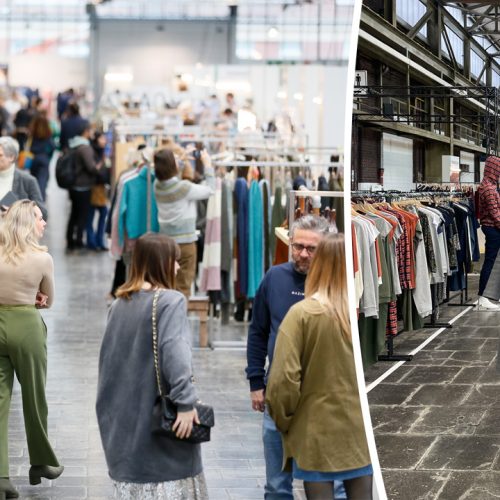To follow in the footsteps of Thimo Schwenzfeier is quite brave. With his ideas and his commitment as show director, Thimo had a decisive influence on Neonyt, which was still called the Greenshowroom and Ethical Fashionshow when it took office eight years ago. Two names that hardly seemed to separate from each other. Thimo has now broken new ground and a more than exciting, because trend-setting position within Messe Frankfurt had to be filled. As a partner of Neonyt, we can say: Everything was done right. Because the position was filled internally in mid-October 2021 with a highly competent woman who has many years of trade fair experience, is co-responsible for the Ethical Style Guide as Show Director at Tendence and has already made a name for herself in the “Frankfurt Fashion Week” task force. Not only because of this, Bettina Bär is the name that you should definitely remember now. Because Bettina, as Show Director of Neonyt (and the new Va: lue fair), together with her new and Thimos old team, will set and develop the direction for the most important B2B fair for sustainable fashion worldwide. Stay tuned!

GREENSTYLE: Next year you will have your 10th anniversary at Messe Frankfurt – Neonyt will also be ten years old in January. Perfect timing for your analog Neonyt start. A quick question in advance: Show Director?
Bettina Bär: Yes, perfectly timed, right? I am looking forward to celebrating my anniversary with the Neonyt! Ten years and a dozen events later and I sometimes still feel as if I had my first day at Messe Frankfurt just yesterday – still full of curiosity and expectation about what the next season will bring, which people will (again) meet and which trends and inspirations one will experience. My title, really a bit difficult, yes – the official name is Show Director, but in the interview I would probably introduce myself as Show Director, at least in German, really nice Denglish.
GREENSTYLE: From January 18 to 20, 2022, theory will turn into practice. In other words: on the Neonyt area on the exhibition grounds in Frankfurt. What are you looking forward to the most?
Bettina Bär: Well then, to physically implement the Neonyt (finally again). I haven’t seen a physical Neonyt myself, but the euphoria of my team and the positive response from our labels are so contagious that I feel like I’ve been around for years. But really: I’m most looking forward to being able to do another trade fair – a real one, live and in color, offline and face-to-face. The Neonyt community has stuck together online and via digital channels over the last few “unusual” seasons, so the first physical meeting simply has to be a fireworks display – I can’t imagine any other way.
GREENSTYLE: Is there also something that you are a little afraid of? After such a short time, it’s almost like jumping into the deep end.
Bettina Bär: Not at all, no. I’m excited, but not because I’m scared, but because I’m excited for January like a little child for Christmas morning. Admittedly, I didn’t have a lot of lead time, but I’m a trade fair person through and through – ten years of people business have shown me what I’m capable of and what I’m good at, and I know that I can rely on the Neonyt team. Within a very short time we got together in a not so easy time, coordinated our working methods and processes and got along really well. I’m looking forward to seeing everyone in action!
GREENSTYLE: In your inaugural comment in October you emphasized that you want to maintain and deepen the values and standards of Neonyt. Do you already have specific plans for deepening your knowledge?
Bettina Bär: The entire textile and fashion industry and, above all, the sustainable sector are increasingly struggling with companies taking up the big buzzword sustainability without even being able to prove their “responsible” practices. And in the increasingly uncertain waters when it comes to real sustainability in the fashion industry – greeenwashing – it was important to me to transparently and openly communicate the efforts of Neonyt and the fashion curation on which our exhibitor selection process is based.
With “Neonyt approved”, you can see at first glance that labels that exhibit with us have successfully passed our sustainability check.
That is why we opted for “Neonyt approved” communication, which makes it clear at first glance that labels that are exhibiting with us have successfully passed our sustainability check and are really green when it says green.
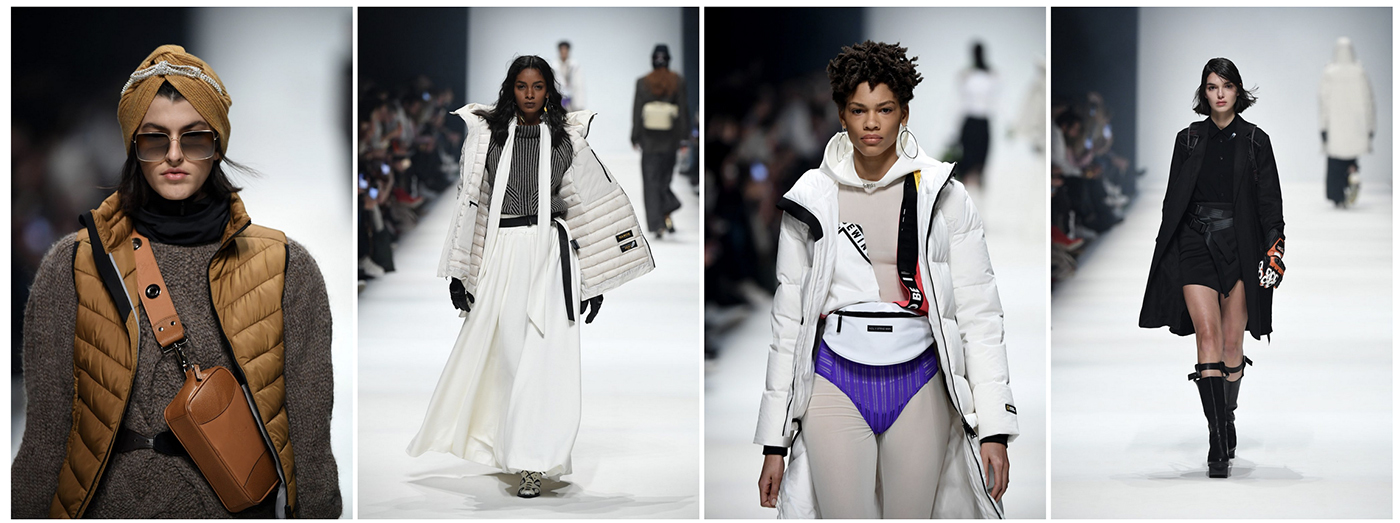
GREENSTYLE: So ‘Neonyt approved’ is a kind of logo or icon that your brands are allowed to wear? What exactly is behind it, how were the criteria determined, what difficulties were there …
Bettina Bär: Right, with Neonyt approved, the own Neonyt-specific icon that signals the successful sustainability check of brands, it is immediately visible that the exhibiting brands meet our social and ecological requirements in terms of sustainability.
Labels that exhibit their collections at Neonyt have always undergone a sustainability and style check before they are approved.
In a multi-page questionnaire, interested labels must provide specific information on ecological and social aspects of their sustainability and document this transparently, for example through certificates such as Bluesign, GOTS, Fair Trade or Oeko-Tex as well as multi-stakeholder programs or code of conducts. Information on their CO2 and water footprint, on their supply and value chain, as well as information on resource efficiency and innovative production cycles are also requested.
Only collections that meet at least 70 percent of the requirements are Neonyt approved and may be exhibited at the tradeshow .
Our cross-sector community – agencies, buyers, dealers, marketing and CSR managers, business journalists and fashion editors – is therefore guaranteed to be truly fashionable. It is important that the checks are only valid for one season, that is, collections are now approved for AW22, for example, and may be exhibited at Neonyt in January – the collection for SS22 and the next event in summer must be checked again will. The checks are carried out internally by us and together with our Sustainability Content Consultants and the Neonyt approved icon must therefore of course not be raised to the same level as an official certification or even an eco seal, but it still shows that Neonyt labels the Are pioneers when it comes to transparent, fair and sustainable fashion.
GREENSTYLE: What role will the SGDs play in Frankfurt in January?
Bettina Bär: The SDGs are like an invisible guide that weaves through our everyday lives. At Neonyt we have been working actively with the sustainability goals for several years and are actively integrating them in a wide variety of formats. In January we will again have an SDG photo wall on the Neonyt area and the 17 targets as individual icons. We want to invite the trade fair participants to deal with the SDGs and to think about which of the goals they are already fulfilling in their everyday or professional life. We want to stimulate direct dialogue and open exchange and how can that be nicer than depicting people with their goals in a photo?
The Sustainable Development Goals are to become a basic requirement for all exhibitors at Frankfurt Fashion Week by 2023.
The entire industry is responsible for finding and implementing solutions for social, economic and ecological change and for anchoring the SDGs in global textile value chains. Now more than ever: We are in the Decade of Action and it is up to us to help achieve the SDGs by the 2030 deadline.
GREENSTYLE: Neonyt has made change its business. Where do you currently see the biggest problems in the fashion industry?
Bettina Bär: The biggest problem is probably (still) “ultra fast fashion” – on the one hand, it makes fashion affordable for everyone, it democratizes it. On the other hand, you have to ask yourself how it can be that clothes can be bought for less than 5 euros. The bottom line is that such a calculation cannot be positive. The problem with sustainable fashion, however, is that it is not possible in terms of resources to produce as much fairly as is currently consumed.
The society needs to rethink.
In my opinion, we have to learn to value fashion and clothing again and not to see them as disposable products. Quality should again be more important to us than quantity – this benefits everyone involved. And this rethinking doesn’t just have to take place in the textile industry, but generally in people’s minds.
GREENSTYLE: The fashion industry is changing – what influence does that have on the task, the objectives of Neonyt? Where will she be in five years?
Bettina Bär: As trite as it sounds, the only constant is change, and sustainability is also an ever-changing concept. Sustainability is multidimensional and you don’t learn it overnight, that much is certain. What does this change do to our goal? Exactly what he has already done in the last few years: our claim to continuously develop, only to push further upwards.
Neonyt sees itself as a source of impetus and ideas, as a challenger and trendspotter.
I purposely chose “spotter” and not “setter”: Neonyt is not a trendsetter, we are not the ones who innovate, reinvent processes or develop alternative materials; these are our labels, our partners, our speakers. We offer a place where they can meet and exchange ideas, ensure the right connections and provide the setting for the necessary change. It remains to be seen where the journey is going – currently we are moving in the periphery of fashion as an interface between design and sustainability, inclusion and digitization, responsibility and technology, diversity and conformity.

GREENSTYLE: It can’t stay the way it is. Even if a lot has already happened, a lot still needs to be done. Where do you see the next steps? And who should and must go in order to change as much as possible as quickly as possible?
Bettina Bär: If we know one thing, it is that change, real, real change takes time. Achieving as much as possible as quickly as possible is actually mutually exclusive. The pandemic of the last two years confronted with the weaknesses of the international textile and fashion industry:
The world is in a crisis of growth.
A lack of transparency in the textile supply and value chain, grievances in production countries and avoidable environmental pollution existed even before the outbreak of the corona pandemic, as did man-made climate change. In times of crisis, however, these international problems came even more clearly into focus. The decades of exponential growth in the conventional textile and fashion industries, but also, for example, in the fossil-fuel automotive, transport and tourism industries have one thing in common: market oversaturation. Where the economy becomes a pure efficiency machine, it is particularly fragile. And what crises are like: They dissolve stuck thought patterns, replace the traditional and force innovations that were previously stuck in the latent. But corona as a catalyst for sustainability? If people have questioned their consumer behavior and the story behind products for a long time, this process has certainly been accelerated.
Change that would have taken years is suddenly a reality. This is the chance for sustainable fashion.
Because when it comes to dressing sustainably, many consumers still have room for improvement. Something is also set in motion culturally. Topics such as gender identity, diversity and people empowerment are not only brand new in society; they can also be found in fashion: unisex fashion, Pride collections, feminist statement shirts. But sudden change can also inhibit progress:
Many fast fashion labels from Europe have shown that they are moving away from their social responsibility in emerging countries.
I think the key lies in the willingness to collaborate, to work together, because after all we are all in the same boat, we all have to act, in the here and now.
GREENSTYLE: And what do you wish for the upcoming edition of Neonyt in January?
Bettina Bär: That everyone who wants to change the textile and fashion industry sustainably and bring it forward will come together at Neonyt. Our labels can successfully map their order business, we can link theory and practice with the Fashionsustain conference and the showcase, we can provide a deeper understanding of sustainability with Prepeek at GenZ and Content Creators and the fashion show finally brings more fashionable glamor back into everyday Corona brings and shows how high-quality sustainability is.
10 questions. 10 answers: Quick and (not) dirty.
Your absolute favorite look (on you!)?
My sweaters from Moss Copenhagen: You will hardly ever find me without one of them. In combination with a pleated skirt and sneakers or ankle boots.
When does your job make you happy?
When at the end of the day I have put something concrete on the track or implemented – not just blabla and appointments in which nothing concrete is decided. When I have the feeling that the pieces of the puzzle are coming together.
What can you do better than everyone else?
I would say “hold 100 balls in the air at the same time” – ok sometimes one falls down, but basically I’m pretty good at keeping track of a variety of topics.
What can you not do at all?
Painting and drawing – my sister inherited this gene and it was not for nothing that she became the fashion designer at home.
What should nobody know about you?
Since it is statute-barred: I stole my sister’s pocket money to buy a funny paperback.
What is your favourite meal?
Very classic: Spaghetti Bolognese.
And which is your favorite holiday destination?
The first time I took the ferry to the port of Porquerolles (French island in the Mediterranean), I found it.
Who do you really want to meet?
For a conversation / exchange with Christine Lagarde For the eye: Jude Law
The last piece of clothing you bought?
A blouse by Summum women.
The best advice you ever got?
You can be happy anywhere – it’s always up to you and your attitude towards new places and the people there
The interview with Bettina Bär was conducted by Mirjam Smend.
